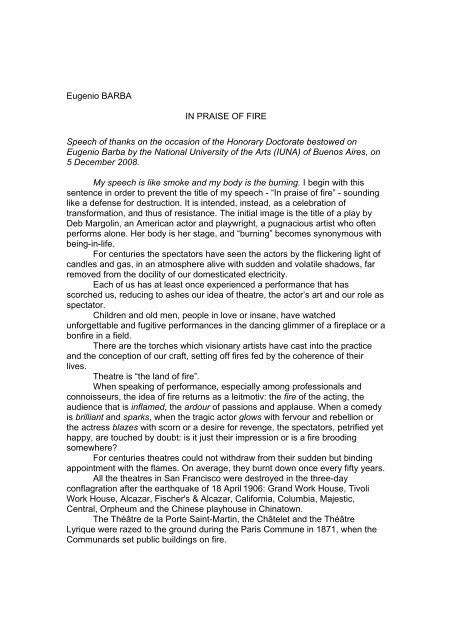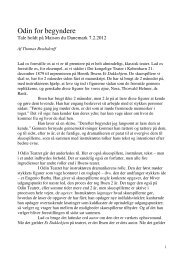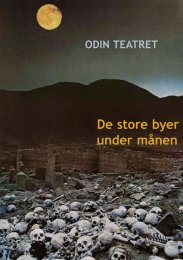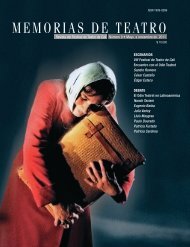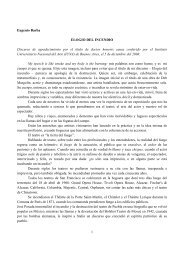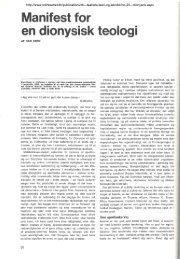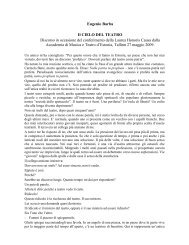Eugenio BARBA IN PRAISE OF FIRE Speech of ... - Odin Teatret
Eugenio BARBA IN PRAISE OF FIRE Speech of ... - Odin Teatret
Eugenio BARBA IN PRAISE OF FIRE Speech of ... - Odin Teatret
You also want an ePaper? Increase the reach of your titles
YUMPU automatically turns print PDFs into web optimized ePapers that Google loves.
José Posada immortalised the devastation by fire <strong>of</strong> the theatre in Pueblain a lithograph that sold like hot cakes in Mexico, while the burning down <strong>of</strong> theBolshoi Theatre in Moscow in 1942, caused by German bombs, inspired Stalin’sspeech which ignited the patriotic spirit <strong>of</strong> his people.A whole theatrical generation perished in a blaze on 5 September 2005 inthe theatre <strong>of</strong> Good Sweif, in southern Egypt: more than forty artists, directors,critics and scholars watching Grab Your Dreams by Mohamed Shawky. Theywere the core <strong>of</strong> the theatrical movement <strong>of</strong> the ‘70s and ‘80s.At times a burning theatre seems to force its inhabitants - the actors -towards other cities, towards exile or new adventures, as was the case withWilhelm Meister in the novel by Goethe. Or as the anonymous artist imaginedwhen he drew the well-known actor Jodelet running for his life from the fire <strong>of</strong> theParisian Théâtre du Marais in 1634. However, if these were catastrophes, howcan we consider them as metaphors?The whole Dutch Pavilion in the Colonial Exhibition was reduced to ashes,the only exception being its theatre. It was the somnolent summer <strong>of</strong> 1931 inParis, and the newspapers moved their readers with descriptions <strong>of</strong> the Balineseperformers escaping with their gilded costumes clutched tightly to their breast.Many Parisians went to see the performances <strong>of</strong> these eccentric dancers, readyto risk their life to save their disguises. Among them, Antonin Artaud.At the end <strong>of</strong> the Preface to The Theatre and Its Double, Artaud speaks <strong>of</strong>fire. He appears to hint at martyrdom, but in reality he is questioning life. Heclarifies what culture ought to be and what it is not. The smoke <strong>of</strong> his words isindeed exhaled by a body. Therefore it is necessary to translate his words to theletter, as a mantra against the spirit <strong>of</strong> his century and the one in which we live:“When we use the word “life”, we must be aware that we are not referringto life as we recognise it from the surface <strong>of</strong> facts, but to that fragile and unstablecentre which forms don’t reach. And if in our time there is something hellish andtruly accursed, it is our artistic hanging around forms, instead <strong>of</strong> being like victimsburnt at the stake and signaling through the flames.”Artaud doesn't explicitly speak about actors. Yet those victims, those signsthrough the flames and that stake have been instantly understood as an extremeand ideal image <strong>of</strong> the actor. Julian Beck and Judith Malina made this image intothe cornerstone <strong>of</strong> their Living Theatre, a theatre-in-life.Antonin Artaud was perhaps the poorest, most wretched and, from apr<strong>of</strong>essional standpoint, the less authoritative among the protagonists <strong>of</strong> thetheatre’s Great Reform in the first half <strong>of</strong> the last century. From the point <strong>of</strong> view<strong>of</strong> the craft, he has little to teach us. Yet, today we count him among ourteachers, although he never was one. He was the student <strong>of</strong> his own divided souland learnt a lot from it. He linked the heart <strong>of</strong> the theatrical art indissolubly to thesufferings <strong>of</strong> the ailing soul. Artaud never laid down arms, and throughout his lifehe kept on succumbing and rising again to fight. Up until the night when he took<strong>of</strong>f a shoe and, holding it in his hand like an amulet, set out on his final journey.
With this image <strong>of</strong> a fire as pure memory, burning without the smoke <strong>of</strong>words and without bodies, I could close my speech.I will conclude, however, with an imaginary toast as is the custom intheatre, when we resort to mime instead <strong>of</strong> material objects.Let’s imagine that here in front <strong>of</strong> me, on this academic table, there is abottle <strong>of</strong> beer. And let’s return to the banks <strong>of</strong> the Thames, to one <strong>of</strong> our ancienttheatrical fatherlands.We find the news <strong>of</strong> the first fire in the history <strong>of</strong> European theatre in aletter by the English aristocrat Sir Henry Watton, dated 2 July 1613 and sent toSir Henry Bacon. He starts by announcing that he will put all political discussionsand state arguments aside, wishing to recount the latest news from the riverside.Sir Watton reports that “The King's Actors”, Shakespeare’s company, hasstaged a new play, All Is True. The performance was sumptuous, withmagnificent costumes and carpets on the stage, a richer and more stately partythan a court ceremony. During the performance, canon salutes were fired and afew sparks landed on the thatched ro<strong>of</strong>, causing the total destruction <strong>of</strong> thebuilding in less than an hour.We know that within one year the Globe was rebuilt, this time with a tiledro<strong>of</strong>. In 1642 the Puritans, in their religious ardour, closed all playhouses,including the Globe whose architectural shape sank into oblivion. A few decadeslater, when theatre was allowed again, the pr<strong>of</strong>essionals adopted the Italianstage. More than three centuries went by and the Globe, one <strong>of</strong> our myths, wasresuscitated. The remains <strong>of</strong> the former building were discovered in 1989 on thebanks <strong>of</strong> the Thames and, on the initiative <strong>of</strong> Sam Wanamaker, the Americanactor and director, a new Globe was reconstructed in 1997 similar to the ancientElizabethan model and close to the place <strong>of</strong> the original one.Sir Watton knew all too well that a drama should end with the light touch <strong>of</strong>a farce, and he concluded his letter reassuring Sir Henry Bacon that only one <strong>of</strong>the spectators had risked his life. His trousers had caught fire and he wouldprobably have been roasted alive if it were not for a jovial drunkard who hadextinguished the flames with his bottle <strong>of</strong> beer.Among so many fires, would it not it be appropriate to <strong>of</strong>fer ourselves acold beer?Translation: Judy Barba


